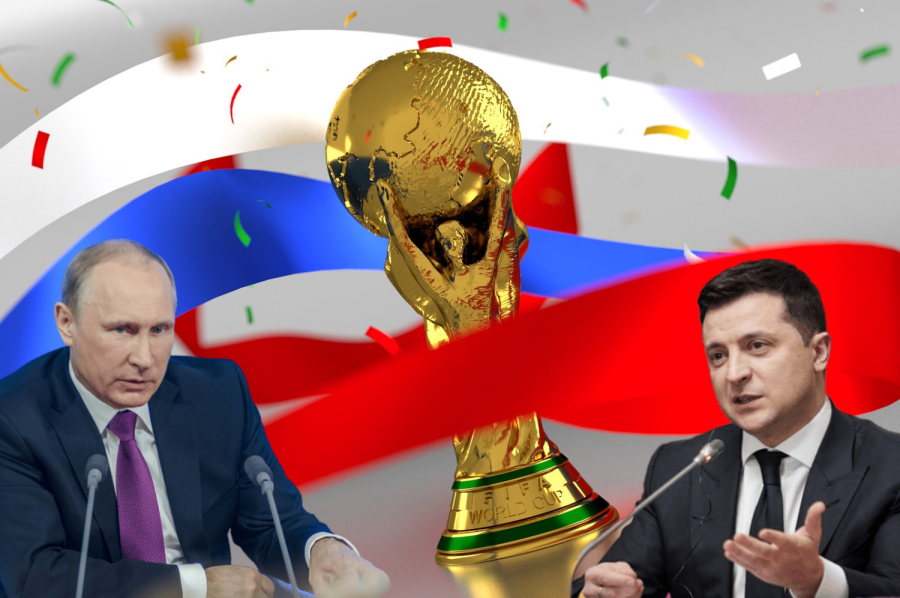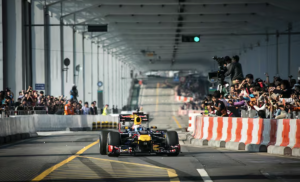FIFA bans Russia from 2022 World Cup amid invasion of Ukraine
Mar 24, 2022
On Feb. 28, four days after Vladimir V. Putin launched a full-scale invasion of Ukraine, the Federation Internationale de Football Association (FIFA) barred Russian soccer teams from playing in international competitions, stripping the nation of an opportunity to compete in the 2022 World Cup.
In a joint statement released by FIFA and the Union of European Football Associations (UEFA), Russia is prohibited from playing against European nations until “the situation in Ukraine improves dramatically” in the coming days. Due to this decision, Poland, whose national soccer team was scheduled to play against Russia this month in Moscow, will now face either Sweden or the Czech Republic.
“I think the message has to be clear across all fields that what Russia is doing is unacceptable and that you cannot make up reasons to invade a country and expect to get away with it,” Alexander Weir, high school teacher, said. “It is putting individual Russian athletes [who are against the invasion] in a horrible position.”
Initially, FIFA imposed light punishments on Russia by banning the nation from playing its national anthem, hosting games, and displaying its national flag at tournaments. However, after many nations—including France, England, and the US—declared that they would be boycotting games against Russia, the FIFA Bureau banned Russian soccer teams from competing altogether.
“I do agree with the decision of FIFA and I think it is the right thing to do given the atrocities that are occurring in Ukraine,” James Tyvand, varsity boys soccer coach, said. “It is part of a larger orchestrated effort by many nations to isolate Russia economically, culturally, and athletically. I do not think it is going to cause Putin to withdraw his forces, but I think it is a strong message that whether Russians are successful or not in this invasion, they are going to be isolated.”
FIFA’s decision to bar Russian soccer federations from qualifying in the World Cup is rare. Though FIFA has previously sanctioned nations involved in doping or sporting corruption scandals in the past, the organization’s decision to prohibit a country from competing due to a political conflict has not happened since 1992.
“It is not very surprising that Russia has been banned from the World Cup given the recent news where many institutions have already banned the nation from participating,” Andrew Shin (10), sports enthusiast, said. “Russia has even been banned from the Society for Worldwide Interbank Financial Telecommunications (SWIFT), so it makes sense that other organizations would follow suit. I think it was a very easy decision for FIFA to eject Russia from this year’s World Cup.”
Russia’s ban from the World Cup came days after the International Olympic Committee (IOC) called upon major sports bodies to punish Russia. While most nations have been supportive of FIFA’s decision, Russian athletes have voiced complaints. In response to FIFA’s sanctions, Russia has called for a hearing at the Court of Arbitration for Sport later this month. Russia’s lawyers have claimed that FIFA has no legal right to ban Russia from the World Cup.
“I think individual athletes who did not take part in aggressive actions against Ukraine but are Russian citizens should not be sanctioned or punished.” Joon Sung Kim (10), avid sports fan, said. “The people who will be suffering the most from this sports ban is not Putin, but the Russian nationals who are in fact mostly against the invasion.”
Russian soccer players, however, have been allowed to break contracts and join other teams, meaning that Russian athletes who play in clubs within other European countries will have a chance to compete internationally.
“Russian athletes are still permitted to play in their club teams in Europe and everywhere else in the world, so their incomes have not been hurt,” Coach Tyvand said. “But the World Cup is a festival of nations—a festival of fair competition and brotherhood—and I do not think that they should be allowed [to play]. They are representing their country, and currently, Russia has violated the sovereignty of the nation of Ukraine, which would go against anything the World Cup stands for.”







